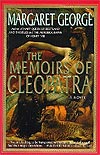20-21c. Literature
Lists | Kleopatra and Pharaoh (Karen Essex) | Memoirs of Cleopatra (Margaret George) | Cleopatra Dismounts (Carmen Boullosa) | The October Horse (Colleen McCullough) | When We Were Gods (Colin Falconer) | Other | End notes
Lists
Cleopatra in fiction list from "Her Infinite Variety," a Cleopatra course taught by Greg Daugherty.
Historical Fiction Author Roundtable. Has eight historical authors answering question about their work, such as "What responsibility do you feel a historical fiction writer has with maintaining the accuracy of the period, the people, and the events?" Both Karen Essex (Kleopatra and Pharaoh) and Margaret George (Memoirs of Cleopatra) are in the group. Unfortunately, it is a "questions by email" roundtable, so no astute moderator got them to compare each other's books and methods.
Kleopatra and Pharaoh (Karen Essex)
 Amazon. Kleopatra by Karen Essex, and the sequel
Pharaoh. Essex reimagines Cleopatra, attempting to purge the Roman propaganda and uncover the capable and intelligent queen beneath.
Amazon. Kleopatra by Karen Essex, and the sequel
Pharaoh. Essex reimagines Cleopatra, attempting to purge the Roman propaganda and uncover the capable and intelligent queen beneath.
KarenEssex.com: Author's website. Includes excerpts, reviews, a synopsis, a readers' guide, bibliography—even a section on "Why I Wrote Kleopatra." The website is wonderfully deep. Colleen McCullough is said to email her bibliography at request; Essex puts her reading right up on the website, together with discussion of her methods and a section on "Kleopatra in the Classroom."
Editor's comment: Essex's diligence is impressive, and, for all I know, her novels are good, but I can't resist some criticism. She makes such an issue of accuracy and superior methodology that she opens her work to examination on that score. See * at the bottom of this article.
Karen Essex Interview with Nashville Scene. The interview is mostly about her career generally, but it has this interesting bit on her motications in writing the Cleopatra books:
"I got this idea to write something that would right the wrongs that history had done to Cleopatra... She wasn't actually this wanton seductress, but she was really a great queen. She had been remembered for the men she slept with, like history remembers so many women, and I just got really angry."
Review of Kleopatra by Irene Hahn (The Roman History Reading Group ), and of Pharaoh. Hahan spots a number of historical errors in the two books, some of which are errors, others pardonable differences in interpretation, and some hardly errors at all (eg., that Cleopatra would have needed Latin to converse with most of the major players at Rome). [mirror]
Pif magazine interview by Jen Bergmark, highlights Essex's methods:
"In writing these books, I looked at all the evidence, and whenever possible, I chose to illuminate her in a favorable light. I wanted to counter all the negative interpretations that have prevailed lo these many centuries."
"Hollywood Confidential" column by Jeffrey Wells discusses Kleopatra and Essex's various screenwriting projects.
Review of Kleopatra on BookLoons (Hilary Williamson). Ranks Essex with Mary Renault—high praise indeed.
Review of Kleopatra and Pharaoh by Amy Coffin, for BookHaven.net.
"The author's exploration of undiscovered, unmentioned and denied facts make a standout novel that gives dry history texts a run for their money."
Interview by BookReporter.com, answering many of the same questions.
Positive review by About.com's Ancient History guru N. S. Gill.
Reviving the real Kleopatra by Karen Essex, for BookPage.
Review of Kleopatra on Teenreads.com (Kate Ayers). Positive.
Interview with Beverly Rowe, MyShelf.com.
Memoirs of Cleopatra (Margaret George)
 Amazon. The Memoirs of Cleopatra a novel by Margaret George.
Margaret George's website has an excerpt.
Amazon. The Memoirs of Cleopatra a novel by Margaret George.
Margaret George's website has an excerpt.
Review by Elizabeth Headrick, blogger/reviewer.
"The woman was absolutely fascinating, so why did a historical novel about her life turn out to be so boring?!"
"Historical novel 'Cleopatra' lacks passion of reality" by Annette Hard, from HoustonChronicle.com's BookTalk forum. Damning.
"Margaret George: Remembering Cleopatra" Interview with Margaret George by Linda Richards. Includes a discussion page (31 so far!).
"Hell yeah." (Short review by Gayle Bird.)
Web Archive: Short, positive review by Kimberly Borrowdale.
Bookcrossing has a review by ireland424, who's only half-way through (this is symptomatic).
Cleopatra Dismounts (Carmen Boullosa)
 Amazon. Cleopatra Dismounts by Carmen Boullosa, translated by Geoff Hargreaves. I haven't read this, but it looks interesting. She seems to get beyond the sterile fussing over Cleopatra's competence and virtue.
Publishers Weekly says:
Amazon. Cleopatra Dismounts by Carmen Boullosa, translated by Geoff Hargreaves. I haven't read this, but it looks interesting. She seems to get beyond the sterile fussing over Cleopatra's competence and virtue.
Publishers Weekly says:
"Mexican writer Boullosa (Leaving Tabasco, etc.) lavishly reimagines the life of the legendary Cleopatra of Egypt in this daring intermingling of fantasy and history told in various voices."
Carmen Boullosa's homepage includes an excerpt, press, etc.
Washington Post review, "Queen of Hearts" by Elizabeth Hand (December 2003). Also here. Hand finds it a joyous, occasionally uneven romp.
Boston Globe review by Amanda Heller (December 2003). The narrative is...
"An intriguing notion. Yet the shifts and swirls of the plot are ill served by a ranting narrative that buries character, incident, everything under an avalanche of obscure classical allusions."
The October Horse (Colleen McCullough)
 Amazon. The October Horse : A Novel of Caesar and Cleopatra by Colleen McCullough. Also available in
mass-market paperback (ie., take to beach).
Amazon. The October Horse : A Novel of Caesar and Cleopatra by Colleen McCullough. Also available in
mass-market paperback (ie., take to beach).
Web Archive: Review by Diane. "I found The October Horse to be an unfortunate conclusion to the Masters of Rome series."
Review by Irene Hahn, from the Roman History Reading Group
Review by Deano on Blogcritics.org.
When We Were Gods (Colin Falconer)
Amazon. When We Were Gods : A Novel of Cleopatra by Colin Falconer. Amazon has a number of nasty reviews; one complains "his Cleopatra seems less a queen of flesh, blood, and iron—i.e. a real woman—than a stereotypically alluring, painted, exotic doll."
Reviewed by Laura Carter, BookReporter.com. Carter rates it a "sensual and imaginative portrait of a great queen's life and times" but also notes "two-dimensional" characters.
Reviewed by Aimee Brown for The Collegian at Washington College; "a magnificent work"
Other
Cleopatra's Heir by Gillian Bradshaw (2002) posits that Caesarion, the child of Julius Caesar and Cleopatra, lived.
Amazon. Channeling Cleopatra by Elizabeth Ann Scarborough. Science fiction involving Cleopatra's DNA.
Miracle Players an English-language street-comedy troupe, performs a rapid-fire Cleopatra in front of the Mamertine Prison during the summer.
"Cleopatra is based on the classical texts of Cassius Dio, Plutarch, Suetonius, Josephus, Shakespeare, John Dryden, George Bernard Shaw and others. The play juxtaposes literary sources with crazy interpretations of Hollywood scenes from 'Roman Holiday' and 'Cleopatra' to create a comic and informative biography of Cleopatra."
Funny overview of "Asterix and Cleopatra" comic. And, what the heck, here's the cover in a few score languages from Alea Jacta Est "Gareth Thomas' Asterix site for grown-ups."
* I'm a little puzzled by Essex's trumpet-blowing about the rigor of her scholarship and the great lengths she took to acquire it. When you get down to it, there just isn't that much to acquire! You could read all the sources that touch directly on Cleopatra's life in a weekend, and master them back-to-front in a month or two. The problem isn't mastering the information, but figuring out how to deal with its paucity and evident partiality. This requires not diligence but training and reorientation—internalizing the methods of source criticism and the techniques (and limits) of ancient history. Such an education would, I think, strip some of the certainly off her page "Separating the Facts from the Fiction What You Don't Know About Kleopatra." Instead of the "facts," this is a list of inferences and suppositions–most quite defensible, but all requiring a suspension of incredulity and an unwillingness to tolerate uncertainty. The motivations she unveils are no more than guesses, and "facts" like Cleopatra's linguistic accomplishments can justly inspire no more than a shrug and a smile.
As regards accuracy, it is not promising that her one primary-source quotation is from that hack Florus, and worse that the quote can't be found there. It comes instead from Velleius Paterculus (2.87), bound together with Florus in the Loeb edition. Velleius' assertion that Cleopatra showed "no womanish fear" plainly applies to her suicide, not her life generally. Its context is a too-convenient contrast with Mark Antony's unmanly demise and, in any case, it's clearly tied up in the very moralizing and distorting gender politics Essex elsewhere condemns and discounts.
It's great that Essex read-up on her subject, but she should be more frank about the paucity and ambiguity of the evidence, and embrace the degree to which her work is art, not history.
Lastly, how often must we hear that Cleopatra was smart and capable, and not a trollop? And how revolutionary is it? After all, Roman sources hardly ignored her skills. Is it really so revolutionary to insist at the top of your voice that Cleopatra didn't sleep with Romans to get her way? That's not subverting the narrative and its prudish preoccupations—that's keeping the preoccupations and fiddling with the details. Maybe she was smart, capable and slept with Romans to get her way. I mean, you GO girl!

All material © 2000–2005 Tim Spalding.
Presented in Association with Amazon
If you enjoy this site you may also like these other sites by me:
Ancient Library. Exciting new project to put dozens of classical dictionaries and other works online.
Alexander the Great on the Web. Links to over 1000 images and 200 images of Alexander.
Genghis Khan on the Web. Comprehensive directory of resources about the great Mongol conqueror Genghis Khan.
Angels on the Web. Angels in religion, culture and art. With over 550 images.